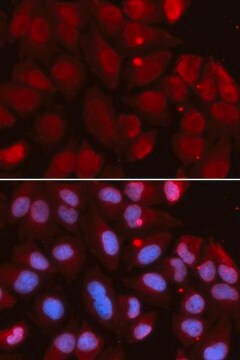I9513
Monoclonal Anti-Human IgG2 (Fc specific) antibody produced in mouse
clone HP-6002, ascites fluid
Sign Into View Organizational & Contract Pricing
All Photos(1)
About This Item
Recommended Products
biological source
mouse
conjugate
unconjugated
antibody form
ascites fluid
antibody product type
secondary antibodies
clone
HP-6002, monoclonal
contains
15 mM sodium azide
technique(s)
indirect ELISA: 1:2,000
isotype
IgG1
shipped in
dry ice
storage temp.
−20°C
target post-translational modification
unmodified
General description
IgG is the main antibody type found in plasma and extracellular fluid and is expressed on B cell membrane. IgG is further subdivided into four subclass- IgG1, IgG2, IgG3 and IgG4 and contribute 65, 30, 5 and 4% in total IgG. IgG2 produce in response to anti-polysaccharide. Monoclonal anti-human IgG2 (Fc specific) antibody can be used in indirect ELISA and Immunofluorometric Assay (IFMA). Mouse anti-human IgG2 (Fc specific) antibody reacts specifically with IgG2 of human but not with other IgG subclasses.
Specificity
Monoclonal Anti-Human IgG2 is specific for the IgG2 subclass and nonreactive with IgG1, IgG3, and IgG4 in an ELISA.
Immunogen
Purified human IgG myeloma proteins covalently linked to polyaminostyrene microbeads.
Application
Monoclonal Anti-Human IgG2 (Fc specific) antibody is suitable for use in ELISA.
Monoclonal anti-human IgG2 (Fc specific) antibody can be used to detect IgG2 subclass by using different immunoassays like- hemagglutination (HA), hemagglutination inhibition(HAI), Imprint Immunofixation (IIF) and Particle Counting Immunoassay (PACIA). It can also be used in immunohistological assays.
Biochem/physiol Actions
IgG2 immunoglobulin is a 146 kDa IgG subtype, which mediates immune response to the polysaccharide antigens of the bacterial capsule. Deficiency of IgG2 poses an increased risk to certain bacterial infections. IgG2 has the least affinity among the IgG subtypes to Fcγ receptors (FcγR). IgG2 exists in three forms namely, IgG2-A, -B, and -A/B. They show variation in the arrangement of fragment antigen binding domain (Fab) and hinge region.
Physical form
This product is provided as ascites fluid with 15 mm sodium azide as a preservative.
Storage and Stability
For continuous use, store at 2-8 °C for up to one month. For extended storage, the solution may be frozen in working aliquots. Repeated freezing and thawing is not recommended. Storage in "frost-free" freezers is not recommended. If slight turbidity occurs upon prolonged storage, clarify the solution by centrifugation before use.
Disclaimer
Unless otherwise stated in our catalog or other company documentation accompanying the product(s), our products are intended for research use only and are not to be used for any other purpose, which includes but is not limited to, unauthorized commercial uses, in vitro diagnostic uses, ex vivo or in vivo therapeutic uses or any type of consumption or application to humans or animals.
Not finding the right product?
Try our Product Selector Tool.
Storage Class Code
10 - Combustible liquids
WGK
nwg
Flash Point(F)
Not applicable
Flash Point(C)
Not applicable
Certificates of Analysis (COA)
Search for Certificates of Analysis (COA) by entering the products Lot/Batch Number. Lot and Batch Numbers can be found on a product’s label following the words ‘Lot’ or ‘Batch’.
Already Own This Product?
Find documentation for the products that you have recently purchased in the Document Library.
Customers Also Viewed
Sodiomon B Sirima et al.
PloS one, 4(10), e7549-e7549 (2009-10-27)
A Phase Ia trial in European volunteers of the candidate vaccine merozoite surface protein 3 (MSP3), a Plasmodium falciparum blood stage membrane, showed that it induces biologically active antibodies able to achieve parasite killing in vitro, while a phase Ib
Issa Nebie et al.
Infection and immunity, 76(2), 759-766 (2007-12-12)
There is longstanding evidence that immunoglobulin G (IgG) has a role in protection against clinical malaria, and human antibodies of the cytophilic subclasses are thought to be particularly critical in this respect. In this cohort study, 286 Burkinabè children 6
A Macpherson et al.
Gut, 38(3), 365-375 (1996-03-01)
In contrast with normal subjects where IgA is the main immunoglobulin in the intestine, patients with active inflammatory bowel disease (IBD) produce high concentrations of IgG from intestinal lymphocytes, but the antigens at which these antibodies are directed are unknown.
H A Schenkein et al.
Infection and immunity, 67(9), 4814-4818 (1999-08-24)
Human immunoglobulin G2 (IgG2) serum concentrations and the IgG2 antibody response to Actinobacillus actinomycetemcomitans can be influenced by genes, by environmental factors such as smoking, and by periodontal disease status. Examination of the IgG2 response to phosphorylcholine (PC), a response
Human IgG2 antibodies display disulfide-mediated structural isoforms.
Wypych J, et al.
The Journal of Biological Chemistry, 283(23), 16194-16205 (2008)
Our team of scientists has experience in all areas of research including Life Science, Material Science, Chemical Synthesis, Chromatography, Analytical and many others.
Contact Technical Service
















